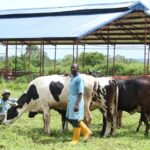Lead poisoning has been silently escalating in Nigeria, killing hundreds in impoverished communities—whether from paints laced with the chemical or from negligence caused by miners.
The 2010 episode, in which an estimted 400 children died in Zamfara, is perhaps the most gruesome case of lead poisoning in the country’s memory.
Yet concerns about lead contamination have not abated. Recently, the Standards Organisation of Nigeria (SON) and Resolve to Save Lives (RTSL) entered into a partnership to improve Nigeria’s capacity for detection and control of lead.
This collaborative initiative took off in Lagos with a training workshop for regulatory officials, lecturers and environmental staff. Participants were taught how to handle advanced XRF analysers, which are portable devices for assessing toxic levels of lead.
One notable policy development is the launch of the federal government’s National Paint Lead Elimination Project, which resulted in one of Nigeria’s first regulations on limiting lead levels in paint.
This policy change ensures that Nigeria now adheres to global regulations on lead levels required for the safety of human lives.
The World Health Organization (WHO) and UNICEF have also been crucial partners for surveillance and awareness. Technical assistance for testing protocols for assessing lead levels was provided by the Global Alliance for Elimination of Lead Paint.
Also, several states have been carrying out random checks for imported paints, toys for children, and makeup. This practice has been successful in rooting out offending brands before they reach store shelves.
Public health entities are working hand-in-hand with these regulations to bring awareness to communities.
For example, in Nigeria, organisations such as Pure Earth Nigeria, an environmental non-governmental organisation, have been working extensively in Zamfara state, where hundreds of children have been left with lead poisoning due to improper mining activities.
Their activities have resulted in a more than 80% decrease in lead levels in these communities.
The collaboration between SON and RTSL joins a slew of interventions targeted at eliminating this silent crisis. Perhaps what makes it outstanding is its approach of addressing prevention by means of early detection.
As one of the world’s least reported environmental concerns roils Nigeria, a blended strategy of homegrown innovation and global collaboration appears to be the long-term solution.
Combating lead poisoning in Nigeria may require more than public enforcement. Public partnership is also key.
Summary not available at this time.






